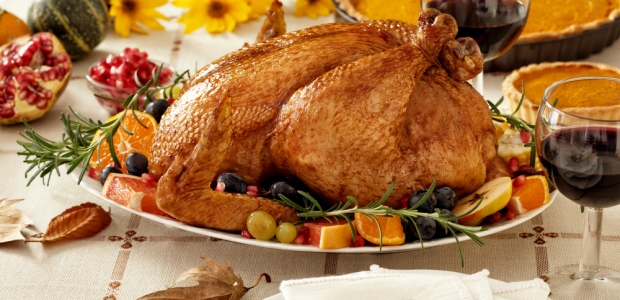
Think Food Safety This Thanksgiving: USDA
Do not wash the turkey because that will spread pathogens onto kitchen surfaces. (The only way to kill bacteria that causes foodborne illness is to fully cook the turkey.)
Millions of turkeys are being cooked and eaten this week, and the U.S. Department of Agriculture is doing all it can to help those millions of cooks prepare and consume their Thanksgiving meals safely, including safely storing and eating those much-loved leftovers. Noting that this is the largest meal many cooks prepare each year, "getting it just right, especially the turkey, brings a fair amount of pressure whether or not a host is experienced with roasting one," USDA observes, offering these tips to make sure a Thanksgiving meal is delicious and safe to serve.
Before cooking a turkey:
- Read labels carefully. Temperature labels show if the bird is fresh or frozen. If you plan to serve a fresh turkey, purchase it no more than two days before Thanksgiving.
- Buy a refrigerator thermometer to ensure the turkey is stored at 40° F or slightly below and a food thermometer to make sure the cooked turkey reaches a safe 165° F.
- Thaw the turkey by using the microwave, the cold water method, or the refrigerator. The refrigerator method is what USDA recommends.
When cooking a turkey:
- Wash your hands with warm water and soap for 20 seconds before touching any food to prevent the spread of infection and illness.
- Do not wash the turkey because that will spread pathogens onto kitchen surfaces. (The only way to kill bacteria that causes foodborne illness is to fully cook the turkey.)
- Keep raw turkey separated from all other foods at all times.
- Use separate cutting boards, plates, and utensils when handling raw turkey to avoid cross-contamination. Wash items that have touched raw meat with warm soap and water or place them in a dishwasher.
- Cook the turkey until it reaches 165° F as measured by a food thermometer. Check the temperature by inserting the thermometer in three places: the thickest part of the breast, the innermost part of the thigh, and the innermost part of the wing.
Follow these steps when eating leftover Thanksgiving food:
- Refrigerate leftovers within two hours to prevent bacteria from growing on the food.
- Store leftovers in shallow pans or containers to decrease cooling time. This prevents the food from spending too much time at unsafe temperatures (between 40 and 140° F).
- Do not store stuffing inside a leftover turkey. Remove the stuffing from the turkey and refrigerate the stuffing and the meat separately.
- Avoid consuming leftovers that have been left in the refrigerator for longer than three or four days. Use the freezer to store leftovers for longer periods of time.
- Keep leftovers in a cooler with ice or frozen gel packs if the food is traveling home with a guest who lives more than two hours away.